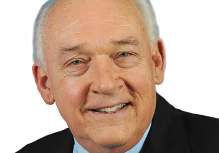
Houma firefighters seek raise
September 10, 2015
MATHERNE: Always cook seafood properly
September 10, 2015By now you are probably well aware of the extensive courage of the 10th anniversary of Hurricane Katrina. I would like to approach the storm from a spiritual point of view.
I recently went to a priest study day and the presenter, the Rev. Victor Galier, reminder us of the basic church teachings on life and dignity of every human person. Here are some highlights.
The church proclaims that human life is sacred and that the dignity of every human person is the foundation of a moral vision for society. This belief is the foundation of all the principles of the church’s social teaching. In our society, human life is under direct attack from abortion and euthanasia. Cloning, embryonic stem cell research and the use of the death penalty are threatening the value of human life.
The intentional targeting of civilians in war or terrorist attacks is always wrong. Church teaching also calls on us to work to avoid war. Nations must protect the right to life by finding increasingly effective ways to prevent conflicts and resolve them by peaceful means. Every person is precious; people are more important than things, and the measure of every institution is whether it threatens or enhances the life and dignity of the human person.
Our faith also calls us to participate in family and community life. The person is not only sacred but also social. How we organize our society – in economics and politics, in law and policy – directly affects human dignity and the capacity of individuals to grow in community. Marriage and the family are the central social institutions that must be supported and strengthened, not undermined. We believe people have a right and a duty to participate in society, seeking together the common good and well-being of all, especially the poor and vulnerable.
We all have rights and responsibilities. The church tradition teaches that we can protect human dignity and we can achieve a healthy community only if we protect human rights. Therefore, every person has a fundamental right to life and a right to those things required for human decency. Corresponding to these rights are duties and responsibilities – to one another, to our families, and to the larger society.
The gospel urges us to take care of the poor and vulnerable. A basic moral test is how our most vulnerable members are faring. In a society marred by deepening divisions between rich and poor, our tradition recalls the story of the Last Judgment (Mt. 25:31-46) and instructs us to put the needs of the poor and vulnerable first.
The dignity of work and the rights of workers: The economy must serve people, not the other way around. Work is more than a way to make a living; it is a form of continuing participation in God’s creation. If the dignity of work is to be protected, then we must respect the basic rights of workers – the right to productive work, to decent and fair wages, to the organization and joining of unions, to private property, and to economic initiative.
We are one human family no matter what our national, racial, ethnic, economic, and ideological differences may be. We are our brothers’ and sisters’ keepers. Loving our neighbor has global dimensions in a shrinking world. At the core of the virtue of solidarity is the pursuit of justice and peace.
We must also care for God’s creation. We show our respect for the Creator by our stewardship of creation. Care for the earth is not just an Earth Day slogan, it’s a requirement of our faith. God wants us to protect people and the planet, living our faith in relationship with all of God’s creation. This environmental challenge has fundamental moral and ethical dimensions that we cannot ignore.





